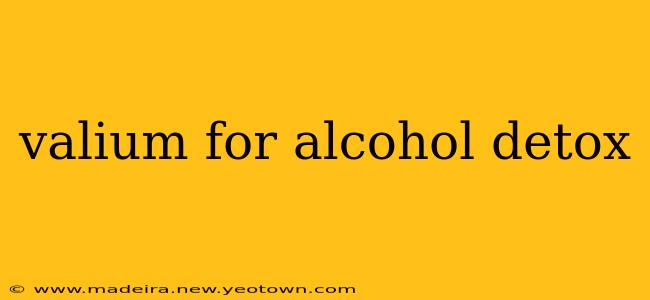The journey of alcohol detox is a challenging one, often fraught with discomfort and potential danger. For some individuals, the withdrawal symptoms can be so severe they require medical intervention. This is where the role of medications like Valium (diazepam), a benzodiazepine, comes into the conversation. But let's delve into this complex issue with careful consideration, exploring the realities of using Valium in alcohol detox and addressing common concerns.
What is Alcohol Withdrawal?
Before we discuss Valium, understanding alcohol withdrawal is crucial. Alcohol is a central nervous system depressant. When someone stops drinking after prolonged heavy use, their brain and body experience a sudden surge in activity, leading to a range of uncomfortable and sometimes life-threatening symptoms. These can include:
- Anxiety and agitation: Intense feelings of unease, nervousness, and restlessness.
- Tremors (the shakes): Involuntary shaking of the hands, legs, or other body parts.
- Seizures: Severe neurological events that can lead to significant complications or even death.
- Hallucinations: Experiencing sights, sounds, or sensations that aren't real.
- Delirium tremens (DTs): A serious, potentially fatal condition characterized by intense confusion, hallucinations, and seizures.
Why is Valium Sometimes Used in Alcohol Detox?
Valium's calming and sedative properties make it useful in managing the intense symptoms of alcohol withdrawal. It works by slowing down the central nervous system, thus mitigating the effects of the sudden increase in brain activity. This can be particularly helpful in reducing anxiety, tremors, and the risk of seizures, especially in severe cases. However, it's crucial to understand that Valium is not a solution to be taken lightly. It's a powerful medication with its own potential for dependence and withdrawal.
Is Valium Safe for Alcohol Detox?
The safety of using Valium during alcohol detox is dependent on various factors, including the individual's medical history, the severity of their alcohol dependence, and the supervision of a medical professional. Under no circumstances should anyone attempt to self-medicate with Valium for alcohol withdrawal. Doing so can be incredibly dangerous and potentially fatal. The medication should only be administered and monitored by a qualified medical professional in a controlled environment, such as a hospital or specialized detox facility.
What are the Risks of Using Valium for Alcohol Detox?
While Valium can be helpful in managing withdrawal symptoms, it carries its own set of risks:
- Dependence: Prolonged use of benzodiazepines like Valium can lead to dependence, making it difficult to stop taking the medication without experiencing withdrawal symptoms.
- Withdrawal Symptoms: Stopping Valium abruptly can result in severe withdrawal, which can be just as dangerous as alcohol withdrawal.
- Interactions with Other Medications: Valium can interact negatively with other medications, potentially leading to dangerous side effects.
- Respiratory Depression: In high doses, Valium can depress breathing, leading to respiratory failure.
What are the Alternatives to Valium for Alcohol Detox?
Several other medications and therapies are used to manage alcohol withdrawal, including:
- Other Benzodiazepines: Different benzodiazepines may be used depending on the individual's needs and the severity of their withdrawal symptoms.
- Non-benzodiazepine Medications: Some newer medications are being developed to treat alcohol withdrawal with a lower risk of dependence.
- Supportive Care: This includes providing a safe and supportive environment, monitoring vital signs, and providing hydration and nutrition.
- Therapy: Therapy, both individual and group, can help address the underlying causes of alcohol dependence and assist with long-term recovery.
How is Valium Administered During Alcohol Detox?
If a doctor deems Valium necessary for alcohol detox, it's usually administered in a carefully controlled and tapered manner. The dose is gradually reduced over time to minimize the risk of withdrawal symptoms. This process is closely monitored by medical professionals to ensure safety and efficacy.
What Happens After Alcohol Detox?
Alcohol detox is just the first step in the recovery process. Long-term treatment is crucial for maintaining sobriety and preventing relapse. This often involves ongoing therapy, support groups (like Alcoholics Anonymous), and potentially medication to prevent relapse.
This information is for educational purposes only and should not be considered medical advice. If you or someone you know is struggling with alcohol dependence, seeking professional help is vital. Contact a medical professional or addiction specialist to discuss treatment options and create a personalized recovery plan. Remember, recovery is possible, and there is hope.

